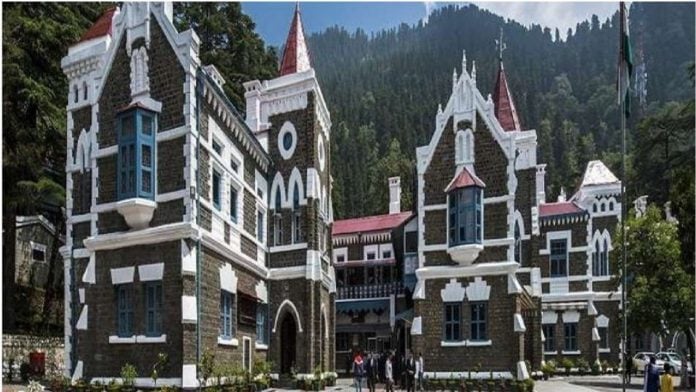The Uttarakhand High Court directed the state government to disclose in its affidavit the particulars of each and every institution in the State imparting education at graduate, post graduate, and professional level, and shall collect information from all such institutions with regard to the constitution of the Anti-Ragging Committee at the institutional levels.
The Division Bench of Chief Justice Vipin Sanghi and Justice Alok Kumar Verma heard a Public Interest Litigation (PIL) filed seeking a direction to the respondents (the National Medical Commission; University Grants Commission; Sushila Tiwari Government Medical College, and; the State of Uttarakhand) to take necessary and permanent measures to prohibit ragging through out the Higher Educational Institutions (imparting education of graduation, post graduation and professional courses) so that barbaric type rapping does not occur in future in any higher educational institution of the State.
The trigger for filing the present public interest litigation is the act of ragging of several 1st year MBBS students, studying at the respondent No. 4 (Sushila Tiwari Government Medical College, Haldwani) which came to light, upon its reporting on 06.03.2022.
The petitioner also seeks a direction to respondents to strictly comply with the provisions of the UGC Regulations on Curbing the Menace of Ragging in Higher Educational Institutions, 2009, and the directions issued by the Supreme Court in Civil Appeal No. 887 of 2009 on 08.05.2009, and the judgment of the Supreme Court in University of Kerala Vs Council of Principals of Colleges in Kerala and others, (2009) 15 SCC 301, and Vishwa Jagriti Mission, through its President Vs Central Government through Cabinet Secretary and others, (2001) 6 SCC 577.
The Court noted that the responsibility for preventing and curbing the activity of ragging, defined in Regulation 3, has been cast on the Head of the Institution, which term is also defined in Regulation 4(1)(g), to mean – the ViceChancellor, in case of a university or a deemed to be university, the Principal or the Director, or such other designation as the executive head of the institution or the college may have. These Regulations lay down the steps that the Head of the Institution is required to take in Regulation 7. In each institution, an Anti-Ragging Committee is required to be nominated and headed by the Head of the Institution, which consists of representatives of civil and police administration, local media, Non Government Organizations involved in youth activities, representatives of faculty members, representatives of parents, representatives of students belonging to the freshers’ category, as well as senior students, non-teaching staff; and such committees should have a diverse mix of membership in terms of levels as well as gender.
Every University is also required to constitute a Monitoring Cell on ragging, which shall coordinate with the affiliated colleges and Institutions under the domain of the University to achieve the objectives of these Regulations. That apart, a District Level Anti-Ragging Committee is required to be constituted by the State Government to be headed by the District Magistrate for the control and elimination of ragging in institutions, within the jurisdiction of the District , held by the High Court.
Only respondent No. 4 has filed its counter affidavit in the present petition. From the same, the Court noted that, in relation to the incident, taken note of hereinabove, one FIR has been registered against unknown persons, on the basis of the complaint made by Assistant Warden, Male Hostel-I, which is neither here, nor there.
The counsel submits that in the following year, the very same students, who were subjected to ragging have themselve resorted to ragging. Thus, it is seen that the activity of ragging is perpetuated by each successive batch, as if to take revenge for the torment that they have been subjected to, by their seniors.
The Court directed all the respondent authorities to file their respective affidavits. Respondent No. 5 (State of Uttarakhand) shall disclose in its affidavit the particulars of each and every institution in the State imparting education at graduate, post graduate, and professional level, and shall collect information from all such institutions with regard to the constitution of the Anti-Ragging Committee at the institutional levels. The State Government shall also collect information from the head of the institutions-whether, they are strictly complying with aforesaid Regulations, or not. The information so collected shall be placed before this Court by the State Government in a tabulated form, indicating the status of compliance / non-compliance by the institutions. The State Government should also disclose, whether, or not, the District Level Committees have been constituted. If not constituted, the same should be constituted within the next two weeks.
Further the Court directed the respondents to collect information from institutions over which they exercise supervision, to collect information with regard to the constitution of the Monitoring Cell, and all such information should also be provided by the said respondents in tabulated form before the Court.
“We put the heads of all graduate level, post graduate level, and professional institutions in the State to notice, that non-compliance of the aforesaid Regulations shall be viewed seriously, and the head of the institution concerned, wherever acts of ragging are found to be occurring shall be held responsible. This order shall be communicated to all heads of institutions by the respondent State within two weeks”, the Bench ordered while posting the matter on 06.06.2023.


